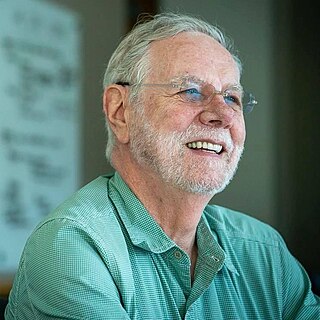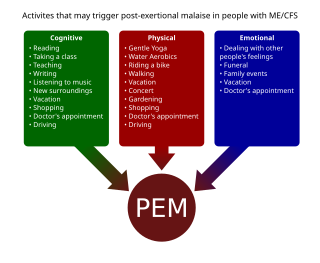
The ME Association is a UK health charitable organization that provides information, advocacy, and services to persons and families affected by ME/CFS, and raises funds for research into ME/CFS. It has been reported to be one of the two largest UK charities for ME/CFS.
Brynmor Thomas John was a British Labour politician.
The Solve ME/CFS Initiative is an American nonprofit that does research and advocacy for myalgic encephalomyelitis/chronic fatigue syndrome (ME/CFS), Long COVID, and other post-infectious diseases. Their stated mission is to assist research into ways to diagnose, treat, or cure these conditions. They also advocate for increased awareness, public funding of research, and access to medical care for patients.

Myalgic encephalomyelitis/chronic fatigue syndrome (ME/CFS) has a long history with an evolution in medical understanding, diagnoses and social perceptions.
Management of ME/CFS focuses on symptoms management, as no treatments that address the root cause of the illness are available. Pacing, or regulating one's activities to avoid triggering worse symptoms, is the most common management strategy for post-exertional malaise. Clinical management varies widely, with many patients receiving combinations of therapies.

Myalgic encephalomyelitis/chronic fatigue syndrome (ME/CFS) is an illness with a history of controversy. Although it is classified as an organic disease by a majority of researchers, it was historically assumed to be psychosocial, an opinion still held among many physicians. The pathophysiology of ME/CFS remains unclear, there exists many competing diagnostic criteria, and some proposed treatments are controversial. There is a lack of education and accurate information about the condition among a significant number of medical practitioners, which has led to substantiated accusations of patient neglect and harm.

Clinical descriptions of ME/CFS vary. Different groups have produced sets of diagnostic criteria that share many similarities. The biggest differences between criteria are whether post-exertional malaise (PEM) is required, and the number of symptoms needed.
The Lightning Process (LP) is a three-day personal training programme developed and trademarked by British osteopath Phil Parker. It makes unsubstantiated claims to be beneficial for various conditions, including ME/CFS, depression and chronic pain.
Patricia A. Fennell is the chief executive officer of Albany Health Management Associates. She is a clinician, research scientist, educator, and author specializing in chronic illness, chronic and post-viral syndromes, trauma, forensics, hospice, global health care concerns, autoimmune and post-viral disease, clinical education, and training.
Graded exercise therapy (GET) is a programme of physical activity that starts very slowly and gradually increases over time, intended as a treatment for myalgic encephalomyelitis/chronic fatigue syndrome (ME/CFS). Most public health bodies, including the CDC and NICE, consider it ineffective, and its safety is disputed. However, GET still enjoys support among a minority of clinicians and organizations.
David Sheffield Bell is an American physician who has done extensive research on the clinical aspects of myalgic encephalomyelitis/chronic fatigue syndrome (ME/CFS). He has also conducted evaluations and research in pediatric ME/CFS and written numerous articles about the condition.
Daniel Peterson is an American physician in private practice in the state of Nevada, and has been described as a "pioneer" in the treatment of Myalgic encephalomyelitis/chronic fatigue syndrome (ME/CFS). He graduated from the University of Rochester School of Medicine, Rochester, New York, in 1976 and was an intern and resident at the University of Utah Medical Center from 1976 to 1979. In 1979, he became a diplomate of the American Board of Internal Medicine. He is president of Sierra Internal Medicine of Incline Village, established in 1981.

Myalgic encephalomyelitis/chronic fatigue syndrome (ME/CFS) is a disabling chronic illness. People with ME/CFS experience profound fatigue that does not go away with rest, sleep issues, and problems with memory or concentration. Further common symptoms include dizziness, nausea and pain. The hallmark symptom is a worsening of the illness which starts hours to days after minor physical or mental activity. This "crash" can last from hours or days to several months.

Ronald Wayne "Ron" Davis is professor of biochemistry and genetics, and director of the Stanford Genome Technology Center at Stanford University. Davis is a researcher in biotechnology and molecular genetics, particularly active in human and yeast genomics and the development of new technologies in genomics, with over 64 biotechnology patents. In 2013, it was said of Davis that "A substantial number of the major genetic advances of the past 20 years can be traced back to Davis in some way." Since his son fell severely ill with myalgic encephalomyelitis/chronic fatigue syndrome Davis has focused his research efforts into the illness.
Rosamund Vallings is a medical doctor, known as one of the leading authorities on Chronic Fatigue Syndrome (ME/CFS) in New Zealand.

Post-exertional malaise (PEM), sometimes referred to as post-exertional symptom exacerbation (PESE) or post-exertional neuroimmune exhaustion (PENE), is a worsening of symptoms that occurs after minimal exertion. It is the hallmark symptom of myalgic encephalomyelitis/chronic fatigue syndrome (ME/CFS) and common in long COVID and fibromyalgia. PEM is often severe enough to be disabling, and is triggered by ordinary activities that healthy people tolerate. Typically, it begins 12–48 hours after the activity that triggers it, and lasts for days, but this is highly variable and may persist much longer. Management of PEM is symptom-based, and patients are recommended to pace their activities to avoid triggering PEM.
Idiopathic chronic fatigue (ICF) or chronic idiopathic fatigue or insufficient/idiopathic fatigue is a term used for cases of unexplained fatigue that have lasted at least six consecutive months and which do not meet the criteria for myalgic encephalomyelitis/chronic fatigue syndrome. Such fatigue is widely understood to have a profound effect on the lives of patients who experience it.
The Open Medicine Foundation (OMF) is a US-based charity that funds research into the illnesses myalgic encephalomyelitis/chronic fatigue syndrome (ME/CFS), fibromyalgia, post-treatment Lyme disease syndrome, and long COVID.
Post-acute infection syndromes (PAISs) or post-infectious syndromes are medical conditions characterized by symptoms attributed to a prior infection. While it is commonly assumed that people either recover or die from infections, long-term symptoms—or sequelae—are a possible outcome as well. Examples include long COVID, Myalgic encephalomyelitis/chronic fatigue syndrome (ME/CFS), and post-Ebola virus syndrome. Common symptoms include post-exertional malaise (PEM), severe fatigue, neurocognitive symptoms, flu-like symptoms, and pain. The pathology of most of these conditions is not understood and management is generally symptomatic.






